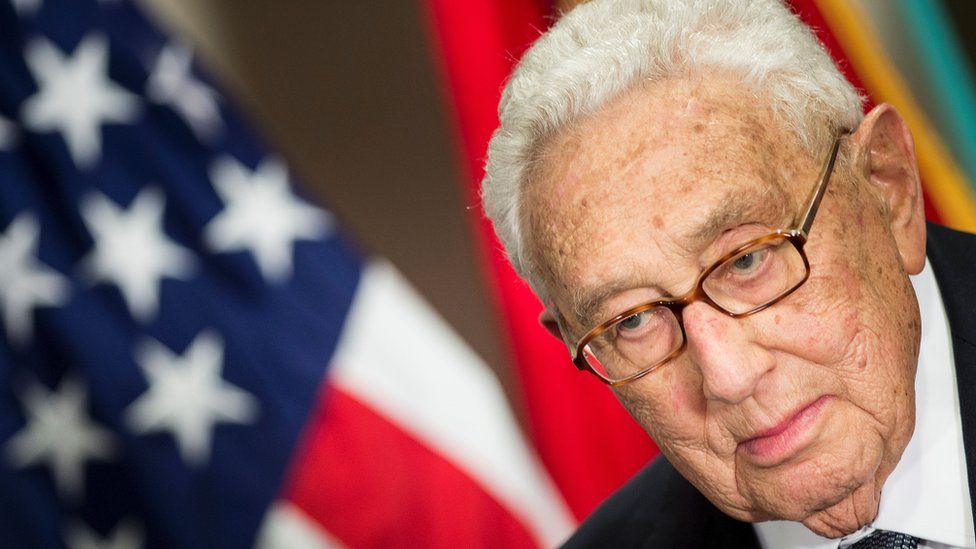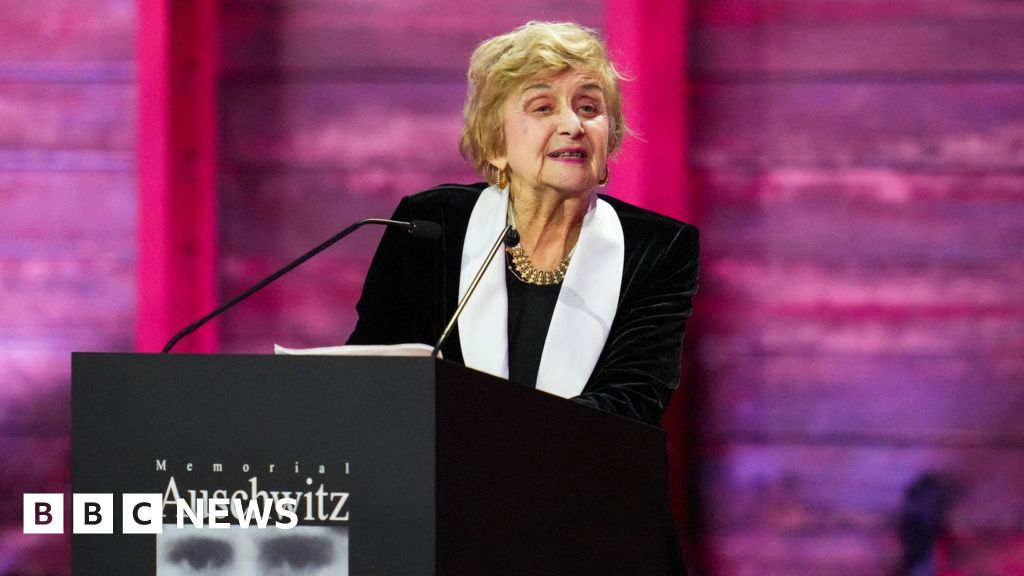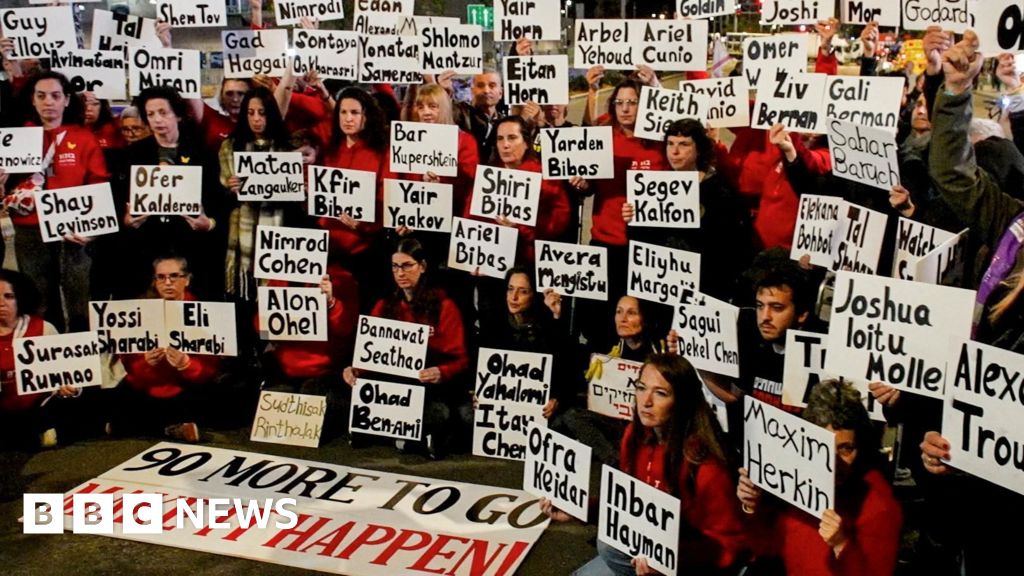ARTICLE AD BOX
 Image source, Getty Images
Image source, Getty Images
Henry Kissinger - who has died, aged 100, at his Connecticut home - divided opinion.
A committed practitioner of 'realism' in foreign relations, he was both awarded the Nobel Peace Prize and roundly condemned as a war criminal.
As US National Security Adviser and Secretary of State, he energetically pursued the policy of détente - which thawed relations with the Soviet Union and China.
His shuttle diplomacy helped end the 1973 Arab-Israeli conflict; and the negotiation of the Paris Peace Accords pulled America out of its long nightmare in Vietnam.
But what his supporters described as "Realpolitik", his critics condemned as immoral.
He was accused of - at the very least - tacit support for the bloody coup that overturned a leftist government in Chile, and of turning a blind eye to the Argentinean military's 'dirty war' against its people.
On hearing that Kissinger had been awarded the Nobel Prize, the comedian Tom Lehrer famously declared that "political satire is obsolete".
Image source, Getty Images
Image caption,Henry Kissenger won the Nobel Peace Prize; but his critics condemned him.
Fleeing Nazi Germany
Heinz Alfred Kissinger was born into a middle-class Jewish family in Bavaria on 27 May 1923.
The family left it late to flee the Nazi persecution, but they joined the German-Jewish community in New York in 1938.
Image source, Getty Images
Image caption,Henry Kissinger - aged 11 - alongside his younger brother Walter.
'Henry' was a naturally shy teenager, who never lost his accent or love of football.
He attended high school by night, while working at a shaving brush factory during the day; and planned to study accountancy but was drafted into the army.
Assigned to the infantry, his brains and language skills were put to use by military intelligence. Kissinger saw action at the Battle of the Bulge, and found himself running a captured German town - despite only holding the rank of Private.
Towards the end of the war, he joined Counter Intelligence. The 23-year-old was given a team to hunt down former Gestapo officers, with absolute power to arrest and detain suspects.
Small nuclear wars
On his return to the United States, he studied political science from Harvard - rising up the academic ladder.
Image source, Getty Images
Image caption,Kissinger became Nixon's National Security Advisor in 1968
In 1957, he published a book, Nuclear War and Foreign Policy - that said a limited atomic war was winnable. Couched in anti-sceptic language, he claimed that "tactical" and "strategic" use of a new breed of smaller missile might be rational.
The book got him noticed. Kissinger's long march to fame and influence had begun; and the "small nuclear war" theory is still influential.
He became an aide to New York governor and presidential hopeful Nelson Rockefeller. And when Richard Nixon won the White House in 1968, Kissinger was offered a plum post: National Security Adviser.
It was a complex relationship. The president felt reliant on Kissinger's advice international relations, but was inclined to antisemitic outbursts and suspicion of American Jews.
The Cold War was at its height: Armageddon had only just been avoided over Cuba, American troops were still in Vietnam and Russia had recently invaded Prague.
Détente
But Nixon and Kissinger set out to reduce the tension with the Soviet Union: reviving talks to scale down the size of their respective nuclear arsenals.
Simultaneously, a dialogue was opened with the Chinese government, through Premier Zhou Enlai. This improved Sino-US relations, and put diplomatic pressure on the Soviet leadership - who feared their huge neighbour.
Kissinger's efforts led directly to Nixon's historic trip to China in 1972, when he met both Zhou and Mao Zedong - and ended 23 years of diplomatic isolation and hostility.
Image source, Getty Images
Image caption,Henry Kissinger and Chinese premier Zhou Enlai at a state banquet in the Great Hall of the People in Beizing.
Vietnam
Meanwhile, the US was endeavouring to extract itself from Vietnam.
"Peace with honour" was a key Nixon election pledge; and Kissinger had long concluded that any US military victories were meaningless - as they could not "achieve a political reality that could survive our ultimate withdrawal."
He entered negotiations with North Vietnam, but agreed with Nixon to clandestine bombing raids on neutral Cambodia - in an effort to deprive the communists of troops and supplies.
The policy resulted in the deaths of at least 50,000 civilians; and the destabilisation of the country led to the Cambodian civil war and the brutal regime of Pol Pot.
Image source, Getty Images
Image caption,Henry Kissinger negotiates with North Vietnam's Le Duc Tho in Paris, 1973. The pair were jointly awarded the Nobel Peace Prize
During a tortuous series of negotiations with the Viet Cong in Paris, Kissinger - by now secretary of state - negotiated American military withdrawal from South Vietnam.
It won him the Nobel Peace Prize - alongside North Vietnam's Le Duc Tho - a decision bitterly attacked by peace campaigners.
Kissinger accepted the award "with humility", and donated the prize money to the children of American servicemen killed in the conflict. Two years later, when communist forces overran South Vietnam, he tried to return it.
Realpolitik
His shuttle diplomacy brought about a ceasefire following the 1973 Arab-Israeli war.
Nixon's secret White House taping system captured Israel's Prime Minister Golda Meir's offering effusive thanks for the way he and Kissinger had treated her country.
But after she left, the tapes revealed a darker Realpolitik. Neither Kissinger or Nixon had any intention of putting pressure on the Soviet Union to allow Russian Jews to seek a new life in Israel.
"The emigration of Jews from the Soviet Union is not an objective of American foreign policy," said Kissinger. "And if they put Jews into gas chambers in the Soviet Union, it is not an American concern. Maybe a humanitarian concern."
Image source, Getty Images 515114332. No fee.
Image caption,Henry Kissinger greets General Augusto Pinochet in 1976.
The election of the Marxist Salvador Allende as president of Chile, however, did trouble the United States. The new government was pro-Cuban and nationalised American companies.
The CIA carried out covert operations in Chile, in an attempt to help opposition groups overthrow the new government. Kissinger chaired the committee that authorised the action.
"I don't see why we need to stand by and watch a country go communist due to the irresponsibility of its people," he said. "The issues are much too important for the Chilean voters to be left to decide for themselves."
Eventually, the military stepped in; and Allende died in a violent coup that saw General Pinochet seize power. Many of his soldiers turned out to have been paid by the CIA.
In later years, Kissinger himself would be pursued by a number of courts investigating human rights abuse and the deaths of foreign nationals under the military regime.
Image source, Getty Images
Image caption,Gerald Ford retained Kissinger as Secretary of State after Watergate.
A year later, Kissinger looked on as a tearful Richard Nixon left the White House - overrun by the Watergate scandal. His successor, Gerald Ford, retained him as secretary of state.
He put pressure on Rhodesia's white minority government to give up power, but was accused of ignoring the Argentine junta's "disappearances" of its critics.
Power: The ultimate aphrodisiac
Controversy followed him after he left office in 1977: the offer of a chair at Columbia University was withdrawn after protests by students.
Image source, Getty Images
Image caption,Henry Kissinger with Princess Diana in 1996
He became a powerful critic of Jimmy Carter and Bill Clinton's foreign policy, arguing the presidents wanted too fast a leap towards peace in the Middle East. For Kissinger, that could happen only inch-by-inch.
After 9/11, George W Bush asked him to chair the investigation into the attacks on New York and Washington, but he was forced to stand down within weeks - after refusing to reveal his consultancy's list of clients and answer questions about conflicts of interest.
He held meetings with President Bush and Vice-President Dick Cheney, to advise them over policy in Iraq following the 2003 invasion. "Victory over the insurgency," he told them, "is the only exit strategy."
Always influential, he briefed Donald Trump on foreign affairs after his election in 2017 - suggesting, among other things, acceptance of Vladimir Putin's occupation of Crimea.
Though, by the time that he reached the age of 100 in 2023, he had changed his view on Ukraine. After the Russian invasion, he argued that President Zelensky's country should join Nato after peace was secured.
Image source, Getty Images
Image caption,Henry Kissinger briefs President Trump in the White House
Henry Kissinger had a vast list of contacts and a ready wit. "Power," he was fond of saying, "is the ultimate aphrodisiac."
A larger-than-life character, he found himself at the centre of power during the most pivotal events of the last century.
To the fury of many, he remained unapologetic about his single-minded pursuit of US interests, and the defence of his adopted county's way of life.
"A country that demands moral perfection in its foreign policy," he once declared, "will achieve neither perfection nor security."

 1 year ago
20
1 year ago
20








 English (US) ·
English (US) ·